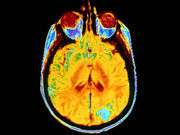Resistance training may cut white matter lesion progression

(HealthDay)—For older community-dwelling women, engaging in progressive resistance training (RT) seems to reduce white matter lesion (WML) progression, according to a study published in the October issue of the Journal of the American Geriatrics Society.
Niousha Bolandzadeh, Ph.D., from the University of British Columbia in Vancouver, Canada, and colleagues conducted a secondary analysis of a 52-week randomized trial of RT. Participants included 54 community-dwelling women aged 65 to 75 years who had evidence of WML on magnetic resonance imaging at baseline. The women were randomized to once-weekly RT (1 × RT), twice-weekly RT (2 × RT), or twice-weekly balance and tone (BAT).
The researchers found that the 2 × RT group had significantly lower WML volume at trial completion compared with the BAT group (P = 0.03). No significant difference was seen at trial completion between the 1 × RT and BAT groups (P = 0.77). Over 12 months, reduced WML progression correlated with maintenance of speed gait (P = 0.49), but not with executive functions (P = 0.06), among participants in the two RT groups.
"The potential clinical implications of these results are significant because WMLs are prevalent in older adults and have negative consequences for mobility and cognitive function," the authors write.
More information:
Abstract
Full Text (subscription or payment may be required)
Copyright © 2015 HealthDay. All rights reserved.














